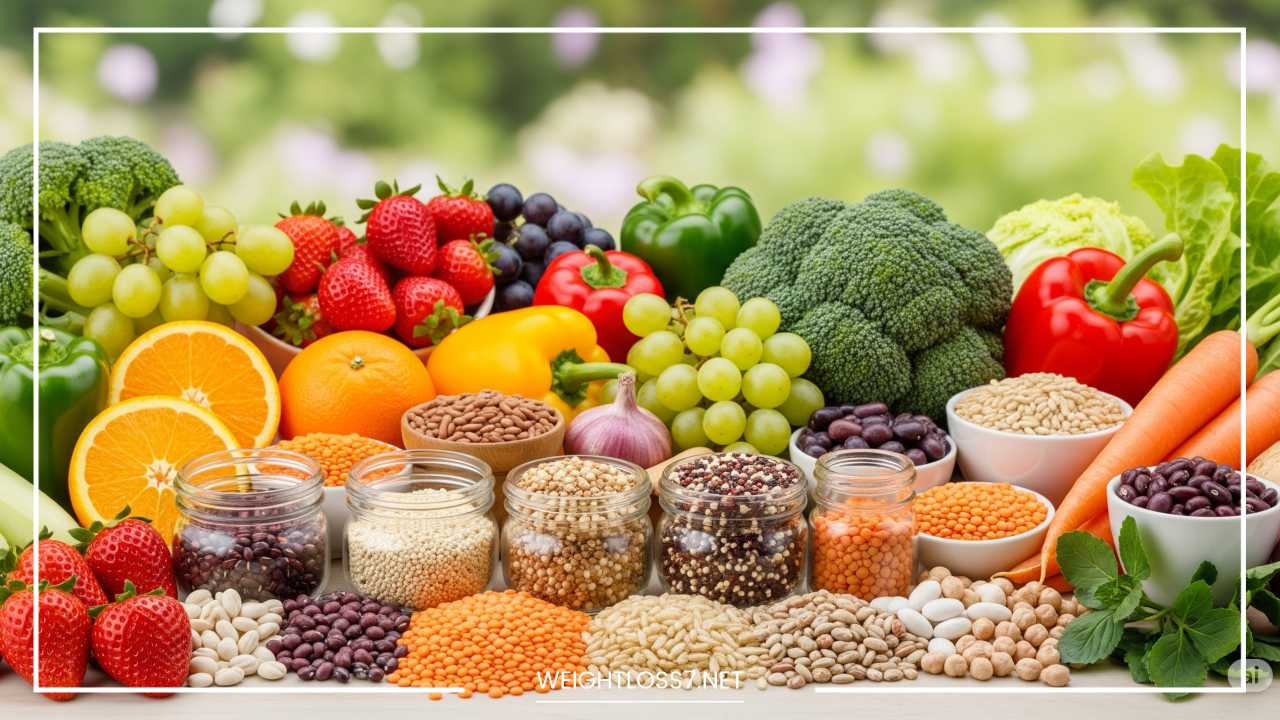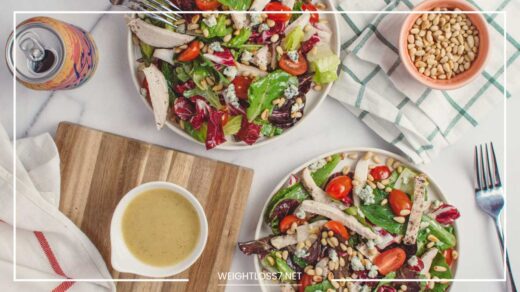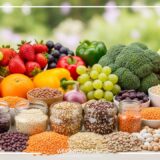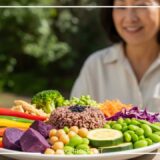What is the Best Diet for Losing Weight
Unlocking Sustainable Weight Loss: The Power of a Plant-Based Vegetarian Diet
The quest for effective and sustainable weight loss is a journey many embark on, often navigating a confusing landscape of diet fads and conflicting information. The importance of diet in achieving and maintaining a healthy weight cannot be overstated. It’s the foundational pillar upon which successful weight management is built, influencing not just our calorie intake but also our hormonal balance, energy levels, and overall well-being.
Unfortunately, the realm of weight loss is rife with misconceptions. Many believe that all calories are created equal, neglecting the crucial role of nutrient density and food sources. The notion that carbohydrates are the enemy persists, despite scientific evidence highlighting the importance of complex carbohydrates for energy and satiety.
This article aims to cut through the noise and explore a powerful and often overlooked approach to healthy weight loss: a well-planned plant-based, or vegetarian, diet. We will delve into the science behind why this dietary pattern can be particularly effective for shedding unwanted pounds and promoting long-term health. It’s important to clarify upfront that our discussion will focus exclusively on plant-derived foods. We will not be discussing the role of meat or eggs in weight loss, instead highlighting the abundance and versatility of the vegetarian culinary world in achieving your weight management goals.
Understanding Weight Loss Basics
At its core, weight loss is governed by a fundamental principle: the law of thermodynamics. To lose weight, you need to consistently expend more calories than you consume, creating a calorie deficit. This forces your body to tap into its stored energy reserves, primarily fat, leading to a reduction in body weight. This concept of energy balance – calories in versus calories out – is the bedrock of weight management.
However, the simplicity of this equation can be misleading. Our metabolism, the complex set of chemical processes that occur within our bodies to maintain life, plays a significant role in how efficiently we burn calories. Factors like genetics, age, sex, and body composition can influence metabolic rate. Furthermore, physical activity is a crucial component of the “calories out” side of the equation. Exercise not only burns calories directly but also helps to build muscle mass, which is more metabolically active than fat tissue, leading to a higher resting metabolic rate over time.
The allure of fad diets often lies in their promise of rapid weight loss through extreme restrictions or unconventional food combinations. While some may yield initial results, these diets are often unsustainable in the long run due to their restrictive nature, potential nutritional deficiencies, and the psychological burden they impose. When individuals inevitably return to their previous eating habits, the lost weight is often regained, sometimes with additional pounds.
Therefore, the key to successful and lasting weight loss lies not in quick fixes but in making sustainable changes to your eating habits and lifestyle. This involves adopting a dietary pattern that you can adhere to long-term, one that provides adequate nutrition, keeps you feeling satisfied, and integrates seamlessly into your daily life.
Why a Vegetarian Diet Supports Weight Loss
A thoughtfully constructed vegetarian diet offers several inherent advantages when it comes to weight management. One of the primary reasons is the lower calorie density of many plant-based foods. Fruits, vegetables, whole grains, and legumes are generally lower in calories per gram compared to many animal products and processed foods. This allows you to consume larger volumes of food while still maintaining a calorie deficit, which can be crucial for satiety and preventing feelings of deprivation.
The high fiber content of plant-based foods is another significant factor. Fiber, found abundantly in fruits, vegetables, whole grains, and legumes, adds bulk to your diet without adding significant calories. It slows down digestion, promoting a feeling of fullness and reducing the likelihood of overeating. Furthermore, fiber plays a vital role in regulating blood sugar levels, preventing the energy crashes that can lead to cravings for unhealthy snacks.
Vegetarian diets are also typically lower in saturated fats compared to diets that include meat and high-fat dairy products. Excessive intake of saturated fats has been linked to an increased risk of heart disease and may contribute to weight gain. By focusing on plant-based sources of fats, such as avocados, nuts, seeds, and olive oil, you can obtain healthy unsaturated fats that are beneficial for overall health and can still be incorporated into a weight-loss plan in moderation.
Numerous studies have supported the link between plant-based and vegetarian diets and successful weight management. Research consistently shows that individuals following vegetarian diets tend to have lower body weight, lower body mass index (BMI), and a reduced risk of obesity compared to non-vegetarians. These findings highlight the inherent advantages of plant-centric eating patterns for weight control.
Despite common misconceptions, a well-planned vegetarian diet can easily provide adequate protein for satiety and muscle maintenance during weight loss. The idea that you need animal protein to build muscle or feel full is a myth. Plant-based sources like legumes (lentils, chickpeas, beans), tofu, tempeh, edamame, quinoa, nuts, seeds, and even some vegetables contain significant amounts of protein. By strategically combining these foods throughout the day, vegetarians can meet their protein needs and support their weight loss goals effectively.
Key Components of a Healthy Vegetarian Weight Loss Diet
Building a successful vegetarian weight loss diet requires a focus on whole, unprocessed plant foods and a balanced intake of macronutrients. Here are the key components to consider:
a. Complex Carbohydrates
Complex carbohydrates are your body’s primary source of energy and are crucial for fueling workouts and daily activities. They are also rich in fiber and essential nutrients. Prioritize the following:
- Whole Grains: Oats (steel-cut or rolled, not instant), brown rice, quinoa, millet, barley, whole-wheat bread, and whole-grain pasta should form the foundation of your carbohydrate intake. These are digested slowly, providing sustained energy and promoting satiety.
- Starchy Vegetables: Sweet potatoes, squash (butternut, acorn), and pumpkin are nutrient-dense sources of complex carbohydrates and fiber. Enjoy them roasted, baked, or mashed.
- Avoiding Refined Carbs: Limit or eliminate refined carbohydrates such as white bread, white rice, sugary cereals, pastries, and sugary drinks. These are quickly digested, leading to blood sugar spikes and crashes that can increase hunger and contribute to weight gain.
b. Plant-Based Proteins
Adequate protein intake is essential for maintaining muscle mass during a calorie deficit and promoting satiety. Excellent vegetarian protein sources include:
- Legumes: Lentils, chickpeas, black beans, kidney beans, and other beans are nutritional powerhouses packed with protein and fiber. Incorporate them into soups, stews, salads, and curries.
- Tofu, Tempeh, Seitan: These soy-based products (tofu and tempeh) and wheat gluten-based product (seitan) are complete protein sources and can be prepared in countless ways. Choose minimally processed varieties.
- Nuts, Seeds, and Plant-Based Protein Powders: Almonds, walnuts, chia seeds, flax seeds, pumpkin seeds, and sunflower seeds provide protein, healthy fats, and fiber. Use them as snacks or or add them to meals. Plant-based protein powders (pea, soy, brown rice) can be helpful for boosting protein intake, especially after workouts.
c. Healthy Fats
While you’re aiming to lose weight, incorporating healthy fats is crucial for hormone production, nutrient absorption, and satiety. Focus on:
- Avocados: Rich in monounsaturated fats, fiber, and various vitamins and minerals. Enjoy them in salads, on toast (in moderation), or as guacamole.
- Nuts and Seeds: As mentioned above, these provide healthy fats along with protein and fiber. Be mindful of portion sizes, as they are calorie-dense.
- Olive Oil: A good source of monounsaturated fats and antioxidants. Use it for cooking and salad dressings.
- Importance of Portion Control: Even healthy fats are calorie-dense, so it’s important to consume them in moderation as part of your overall calorie-controlled diet.
d. Fruits and Vegetables
These are the cornerstone of a healthy vegetarian weight loss diet. They are low in calories, high in fiber, and packed with vitamins, minerals, and antioxidants.
- High Fiber, Nutrient-Dense: Aim for a wide variety of colorful fruits and vegetables. The fiber will help you feel full, and the nutrients will support your overall health.
- Best Choices for Weight Loss: While all fruits and vegetables are beneficial, some are particularly helpful for weight loss due to their high fiber and water content and lower glycemic index. These include:
- Berries: Strawberries, blueberries, raspberries, and blackberries are low in calories and high in fiber and antioxidants.
- Leafy Greens: Spinach, kale, lettuce, and collard greens are incredibly low in calories and packed with vitamins and minerals.
- Cruciferous Vegetables: Broccoli, cauliflower, Brussels sprouts, and cabbage are high in fiber and contain compounds that may support metabolism.
Common Mistakes in Vegetarian Weight Loss Diets
While a vegetarian diet can be highly effective for weight loss, it’s possible to make mistakes that hinder your progress. Be aware of these common pitfalls:
- Relying Too Much on Processed Vegetarian Foods: The market is flooded with vegetarian alternatives to meat products like veggie burgers, sausages, and fake meats. While these can be convenient occasionally, many are highly processed, loaded with sodium, unhealthy fats, and artificial ingredients, and may not be significantly lower in calories than their meat counterparts. Focus on whole, unprocessed plant foods as the foundation of your diet.
- Overeating High-Calorie Plant Foods: While nuts, seeds, avocados, and olive oil are healthy, they are also calorie-dense. It’s easy to overconsume them if you’re not mindful of portion sizes. Keep track of your intake and enjoy them in moderation.
- Ignoring Portion Sizes: Even with healthy, lower-calorie foods like whole grains and legumes, consuming excessive portions can lead to a calorie surplus and hinder weight loss. Pay attention to recommended serving sizes.
- Not Balancing Macronutrients: While focusing on plant-based foods is key, ensure you’re getting an adequate balance of complex carbohydrates, protein, and healthy fats. Skimping on protein can lead to muscle loss, while insufficient healthy fats can impact hormone production and satiety.
Meal Planning Tips and Sample Meal Ideas
Effective meal planning is crucial for staying on track with your weight loss goals and ensuring you’re getting adequate nutrition. Here are some helpful tips:
- Batch Cooking: Prepare larger quantities of grains, legumes, and roasted vegetables on the weekends or during your free time. This provides you with healthy building blocks for quick and easy meals throughout the week.
- Mindful Eating: Pay attention to your hunger and fullness cues. Eat slowly and savor your food, avoiding distractions like1 screens. This can help prevent overeating.
- Grocery Lists: Plan your meals for the week and create a detailed grocery list to avoid impulse purchases of unhealthy items.
- Focus on Variety: Incorporate a wide range of plant-based foods to ensure you’re getting a diverse array of nutrients and to keep your meals interesting and enjoyable.
Here is a sample 1-day vegetarian meal plan for weight loss:
- Breakfast: Overnight oats made with ½ cup rolled oats, 1 cup unsweetened almond milk, 1 tablespoon chia seeds, and ½ cup mixed berries.
- Lunch: A large salad with 1 cup cooked lentils, ½ cup cooked quinoa, 2 cups mixed roasted vegetables (broccoli, bell peppers, zucchini), and a light vinaigrette dressing made with olive oil and lemon juice.
- Snack: ½ cup hummus with 1 cup sliced carrots and cucumber.
- Dinner: Stir-fried tofu (4 oz firm tofu, pressed and cubed) with 2 cups mixed vegetables (broccoli florets, sliced bell peppers, snap peas), 1 tablespoon low-sodium tamari, 1 teaspoon ginger, and ½ cup cooked brown rice.
Remember that this is just a sample, and you can adjust it based on your individual preferences and calorie needs.
Lifestyle Factors That Complement Diet
While diet is paramount for weight loss, other lifestyle factors play a significant supportive role:
- Physical Activity: Aim for a combination of strength training (to build and maintain muscle mass) and cardio (for burning calories and improving cardiovascular health). Regular exercise enhances your calorie deficit and offers numerous other health benefits.
- Sleep and Stress Management: Inadequate sleep and chronic stress can disrupt hormones that regulate appetite, leading to increased cravings for unhealthy foods and potential weight gain.2 Prioritize getting 7-9 hours of quality sleep per night and practice stress-reducing techniques like yoga, meditation, or spending time in nature.
- Hydration: Drinking enough water is essential for overall health and can also help with weight loss by promoting feelings of fullness and potentially boosting metabolism slightly. Aim for at least 8 glasses of water per day.
- Mindful Eating Habits: Beyond just paying attention during meals, cultivate a positive relationship with food. Avoid restrictive dieting mentalities and focus on nourishing your body with wholesome plant-based foods.
Final Thoughts and Encouragement
Adopting a balanced vegetarian diet can be a highly effective and sustainable path to achieving your weight loss goals and improving your overall health. By focusing on nutrient-dense whole plant foods, you can naturally reduce your calorie intake, increase your fiber consumption, and enjoy delicious and satisfying meals.
Remember that consistency is more important than perfection. There may be times when you deviate from your plan, and that’s okay. The key is to get back on track and maintain a long-term commitment to healthy eating habits. This journey is personal, so feel free to experiment with different vegetarian recipes and find what you truly enjoy. Embrace the abundance and versatility of the plant-based world, and celebrate the progress you make along the way. You have the power to create lasting change and achieve a healthier, happier you through the incredible benefits of a well-planned vegetarian lifestyle.


















